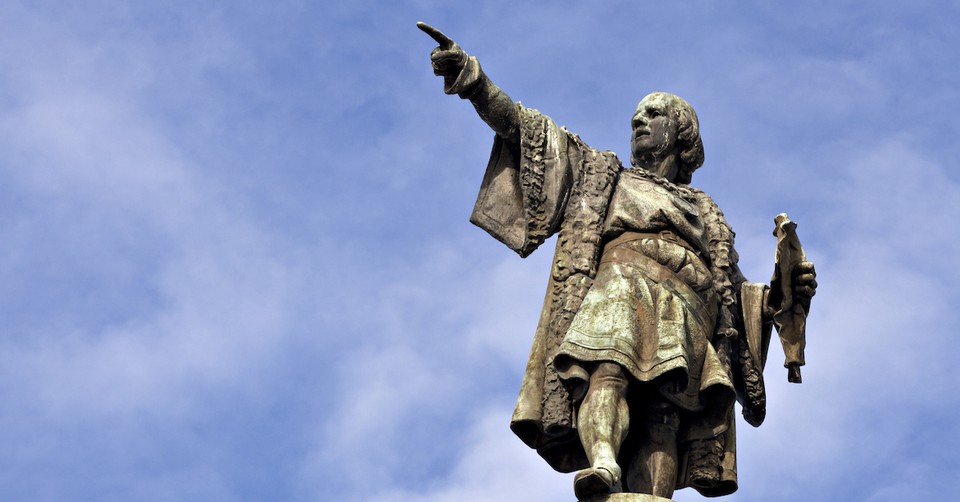A Balanced Approach to Learning about Columbus Day

Columbus Day is right around the corner, and you may be wondering how or if to incorporate this holiday into your teaching. Many call for Christopher Columbus to be vilified or canceled, and some have even renamed this federal holiday celebrated on the second Monday in October.
However you view Columbus, you cannot deny his significant impact on the trajectory of world history. Many countries throughout the Americas commemorate this intrepid explorer's arrival to the region in October 1492. Why not avoid the current history hysteria and take a balanced approach to teaching your children about this multi-faceted part of our heritage?
A Brief Biography
Growing up in the middle of the Renaissance era, Columbus had no significant cultural advantages for success. As a young adult, he took to the sea and earned a living by trading. As time went on, he became convinced there was an undiscovered passage to trade in the east by sailing west. He repeatedly pitched his ideas to several monarchs in Europe and finally convinced the king and queen of Spain to sponsor his attempt to reach China by crossing the Atlantic Ocean. As a businessman who also invested in the expedition, he expected remuneration. The monarchs signed a contract specifying his financial and leadership rewards if he accomplished such a risky feat.
Columbus set sail early in August 1492 with three ships—Niña, Pinta, and Santa María. He finally found land in October. His diary describes his experiences there—the landscape, native people, and resources. He also indicates that he traveled to other islands, hoping that Asia was nearby. Overall, he made four voyages and explored various parts of northern South America, Central America, and the islands of the Caribbean. Beyond exploration, Columbus was expected to establish diplomacy and Spanish outposts in these locations.
Criticisms of Columbus
Critics of Columbus quickly point out that he did not, in fact, "discover" anything. Insomuch as every place he went already had inhabitants, they are correct. Obviously, those communities knew their own land well. Also, Columbus never set foot in North America. As you delve into the record, you will discover that the treatment of natives by the Spaniards who took up residence was sometimes tragic. Yet the explorations of the Americas significantly connected cultures that were previously unaware of each other. The world forever changed.
God's Providence
Sovereign God establishes rulers and authorities for many different purposes, including protection, judgment, wisdom, leadership, and advancing His kingdom. Romans 13:1(NLT) says, "Everyone must submit to governing authorities. For all authority comes from God, and those in positions of authority have been placed there by God."
God has worked His perfect plan through imperfect people since the beginning of time. His ways do not mirror human ways, so we often do not understand His purpose without divine insight. We should ask, "God, will you help me to see how You were preparing and providing during this place in history?"
If we study the population shifts from Europe to the Americas since the time of Columbus, we can see how God used the explorers and colonialism to expand His kingdom and make Jesus known to all people in all lands. We also see how the expansion of western civilization led to the ideals embodied in America, the first nation with liberty for all written into the governing documents.
Because of sinful human nature, none of these shifts happened easily or perfectly. Still, God's plan of redemption continues to relentlessly shower mercy on humankind throughout history until the return of Christ.
I don't point out God's providence to whitewash the history of explorers, colonialism, slavery, or any other evils that taint all history. We should never minimize these sins. We must not, however, lose sight of God's ability and desire to redeem and restore.
A Balanced Approach
Striking a balance in the historical perspective includes acknowledging both virtues and vices of individuals. Consider how God portrays David in the Bible. As one of the most influential figures in biblical history, David fell hard into sin. Yet God redeemed and restored him, saying David's will aligned with His own (Acts 13:22). Even more amazingly, God used David to produce Jesus Messiah.
Our task as parents is to teach our children about Columbus and other individuals in history through a biblical worldview.
In Columbus' era, the norm in almost every world culture overwhelmingly included the conquerors and the conquered, masters and slaves, and royalty and serfs. This was true in Europe and most of the lands Columbus explored. This historical context helps students to understand the cultural reasoning for actions rather than forcing historical figures into a modern-day box that doesn't fit.
Columbus' Motives and Subsequent Actions
Christopher Columbus wrote one book, Book of Prophecies, to explain part of his motivation for sailing west to arrive at the Indies. This excerpt written in America's Providential History (Beliles and McDowell 45) shows Columbus' spiritual perspective.
No one should fear to undertake a task in the name of our Savior if it is just and if the intention is purely for His Service. The fact that the gospel must still be preached to so many lands in such a short time—this is what convinces me.1
Although Columbus claimed the noble motive of spreading the gospel, history reveals that his actions did not always comport with God's standards. It's also worth noting, however, that many of the cultures he met were also steeped in violence and human trafficking. Nothing on either side justifies sin, but as we observe and learn from history, we must consider all the facts.
At one point in his seafaring, some of Columbus' detractors brought him up on charges. Columbus vigorously defended himself to the Spanish monarchs and was cleared of most wrongdoing. In his Lettera Rarissima, he wrote, "Let those who are fond of blaming and finding fault, while they sit safely at home, ask, 'Why did you not do thus and so?'" His point? They should understand more about the context of events he faced before casting stones. Columbus rightly said that it is easy to misjudge the complexities of a situation from a comfortably distant perspective.
Older students should be challenged to examine Columbus and his time in history from every angle using source texts and context to develop and enhance reasoning skills. As they apply their biblical worldview to interpret events, help them learn about the worldview of others who judge Columbus differently.
Activities to Learn about Columbus
Consider using some of the following ideas in your lesson plans for October. You can find good resources at Wallbuilders.
Geography: Use a blank world map to trace the routes of Columbus' four journeys. Color the places he landed and label the past and present names. Find them on a present-day globe or map.
Reading: Read aloud or assign a developmentally appropriate book about Columbus. As you read, have your children make keyword outlines which they later orally retell in their own words.
Writing: Assign a writing project commensurate with the level of your child's achievement. For a younger child, you may ask for sentences using spelling words from the book you read. Older elementary children may write a paragraph or two from the keyword outline they wrote in the reading assignment. Middle school and high school-aged students may write an essay or mini-term paper. Choose a type of essay (expository, narrative, descriptive, argumentative) that fits with your overall writing goals.
Puzzles and Games: Look up and print coloring pages, word searches, and crossword puzzles related to Columbus Day and explorers.
Hands-On: Research the dimensions of Columbus' ships. Use blocks or rope to outline the approximate size in your yard and spend the day "on the ship." Consider the supplies you will need to prepare in advance, how you will spend the day, jobs to be done, food preparation, sleeping quarters, and, yes, even toilet needs.
Arts and Crafts: Make a model of the Niña, Pinta, or Santa María, or simply find a coloring page of the ships. You can download a free printable paper model of the Santa Maria here.
Health: Research the types of food sailors would have eaten on the voyage. Discuss the nutritional balance of the food they ate and the importance of fruits and vegetables. Look up the symptoms of scurvy. Prepare and eat some of the foods you research. If you want more tasty food, you could prepare an Italian-themed meal since Columbus was born in Italy.
Science: It's difficult for children with instant access to map apps on their phones to imagine navigation across a vast unknown ocean. Research how Columbus navigated, including magnetic declination for older students. Take a walk in the park using signs in nature to understand north, south, east, and west. Create a map of your travels as you go.
Reasoning: Ask older students to identify the vices and virtues of Christopher Columbus and draw reasoned conclusions about his actions. Ask them to back up their assertions with evidence. Discuss the culture's current inclination to judge the past based on today's norms.
Bible: Identify the virtues and flaws of Columbus. Find Bible verses that address these issues.
Learning Extension: Assign research about some of the explorers who came after Columbus. Read books and chart their journeys on the world map. Design a timeline on the wall using sticky notes to show how the explorations coincided with other world events. Discuss how God providentially used the work of each explorer in America's history.
No Perfect People
We cannot simply write off the virtues and accomplishments of historical figures who morally lost their way at times. If we think that's the right approach, then we might as well cancel ourselves and every other individual who has ever lived—except Jesus.
Instead, let's remember that God raised them to prominence "for such a time as this" (Esther 4:14).p
Note: 1Beliles, Mark A. and Stephen K. McDowell. America’s Providential History. Providence Foundation. 1989.
Editor's note: 12 states, including D.C. have changed the holiday's name to Indigenous People's Day.
Photo credit: ©GettyImages/IhsanGercelman

Related Resource: Strengthening Your Marriage While Raising a Child with Disabilities
In this episode of Empowering Homeschool Conversations, your host Annie Yorty and her special guests dive into the unique challenges and beautiful complexities of maintaining a strong, loving partnership while navigating the demands of special needs parenting. Our expert guests bring a wealth of knowledge and personal experience to the table, offering invaluable insights and practical strategies for fostering resilience, connection, and joy in your marriage. Whether you're homeschooling parents seeking support, or simply looking for ways to strengthen your relationship amidst life's challenges, this conversation promises to provide the inspiration and tools you need to thrive together. Listen now!
Originally published October 10, 2024.





